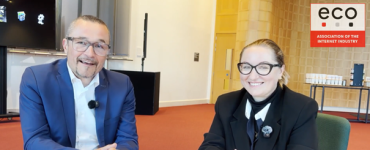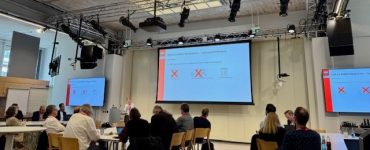Dr. Sandra Schulz is Head of the Policy and Law Division at eco – Association of the German Internet Industry. Her daily business is to represent the interests of the Internet industry in German and European politics. But how does this occur, and how can eco members ensure that they have a voice in this process? Dr. Schulz explains in interview.
Dr. Schulz, the Internet industry in Germany and Europe is a very broad field – which topics is eco active in?
eco is active in all topics related to the Internet and Network Policy. Right at the moment, we’re busy with the new joint proposal from the Ministries of Justice and the Interior on a re-introduction of Blanket Data Retention in Germany. In mid-April, the “Guidelines for the Introduction of an Obligation to Store Traffic Data and the Highest Storage Time Limits” were published, and we expect the first draft legislation in the coming weeks. Another current issue is the recently published draft bill from the Ministry for Economics on changes to the Telemedia Act and a clarification of the legal requirements for Wi-Fi operators. But, of course, we’re also active in all other national and European issues which affect the business interests of our members: Net Neutrality, Data Protection, IT Security, Youth Media Protection, Copyright, and Internet Governance, to name but a few.
How does eco, as the Association of the German Internet Industry, represent the interests of a large number of companies?
The Policy and Law Division at eco, which I head, is responsible for the political representation of interests. Almost the entire team is based in central Berlin, at the Gendarmenmarkt, in the eco Capital Office. Youth Protection is represented by the Internet Complaints Hotline in Cologne. Our daily business is to represent the interests of our members. The focus is on the development of position papers, position statements, and papers on the current intentions of the Federal Government in terms of network and Internet policy. The agreed positions of the Internet industry are then transmitted and discussed via discussions, events, and political PR work targeting politicians, the media and the public. Of course, we’re also present at a lot of events, where we represent the interests of the Internet industry on the podium or as a guest.
What should I, as a company, do to ensure that my interests are given voice at eco?
Firstly, the company needs to become a member of eco. Following this, it is important for us to know the right contact person in the company for political representation. We will then add this person to our mailing list for the Competence Group Law and Regulations, which is led by Mr. Lesch. Via this list, the company receives up-to-date information about all national and European legislative initiatives and intended policies. The agreement about eco’s position also occurs via the list. After the Law and Regulations area have created a first draft dealing with a proposed piece of legislation, this is sent the members for agreement. Now, the company can voice their interests, can jointly work on the paper and develop the Internet industry’s position.
What services does the Policy and Law Division offer its members?
For every week of the German parliamentary session, we publish a newsletter for our members. This provides detailed information about Internet-relevant developments and discussions in parliament and in Europe and amendments to legislation, as well as important dates and information about individuals from the political world. We also represent the points of view and interests of the Internet industry on a specific current issue through the publication of the eco Politikbrief (“policy briefing”). Members are also always invited and very welcome to participate in our events in Berlin. We offer a range of formats, including the New Year’s Reception, the Summer Party, the Politikfrühstück (“policy breakfast”), the series “Politik im Gespräch” (“policy under discussion”) and our PolITalks. Some of the formats are open for all, others are exclusively for our members. The objective of all of the events is to communicate the position of the sector to the political players and to offer our members the opportunity to get into conversation with Berlin politics.
What do you most value about your work? What brings you most satisfaction in doing association work?
Above all, I value the product of my work, “the Internet” and the people that I meet and with whom I collaborate in a variety of different ways. The Internet is revolutionizing humanity as a whole, and every day a bit more of the society. As the head of the lobbying activities at eco, I impact the shaping of the Internet every day, as does my team, so that it can develop further for the benefit of all. Of course, the question always arises: What kind of a digital society do we want to live in? Now more than ever, when politics, with the “Digital Agenda of the German Federal Government” and the Parliamentary Committee for the Digital Agenda, has truly discovered the Internet, I find it fascinating to be influencing its design on behalf of eco. The political discussions are to some extent only just really getting started and decisions on the most important issues are expected in the next few years – for example, how will copyright develop, will all data be transmitted neutrally in the Internet, will programming soon become a compulsory subject at school, how can everyone operate freely in the Internet? I find this all fascinating, and I am happy that we, as eco, can be involved in shaping the Internet.



